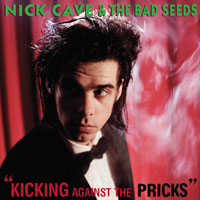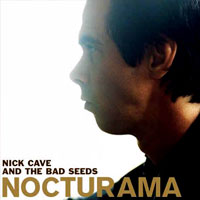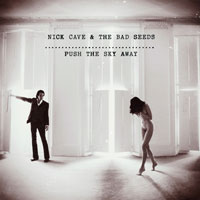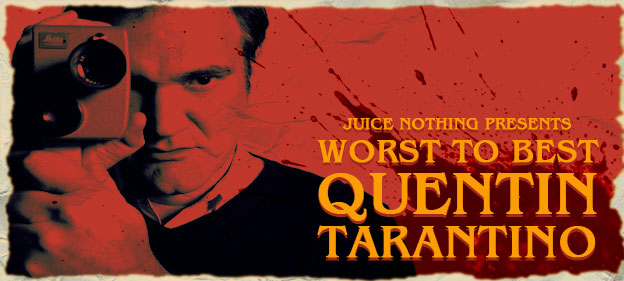
Tarantino has always felt like the most tasteless of all directors to label as your favourite. It seemed like the moment he simultaneously fell upon everyone’s radar in my high school at the exact same time, there was not a youth with enough education to dare call anyone better, and still to this day, he seems like the laziest go-to choice for the casual movie viewers' title of 'greatest director in the world'. I lose respect for anyone who says this, even in our old age.
However, I must stay true to my tastebuds, and sheepishly surrender that, yes, indeed, Mr Tarantino may very well be the greatest director to appear in the scene in the last two decades. And I know why this is. It’s because he cheats! Everything Tarantino has ever done was shamelessly stolen without even trying to hide it, his entire filmography working like a mashed amalgamation of pop culture goodness, rebranded as his own with the original label still visible beneath; a copy cat without any reservations, essentially flexing his film knowledge out in the sun, like a rapid succession of pretentious winks for anyone else who had been paying as close attention as he has—which isn’t anyone. And it is exactly this theft that makes him so captivating. It’s his absolute adoration for the film medium itself, a love which runs deeper and more obvious than any other director that could possibly come to mind, no matter how far back you look. His very glee inside of the artform glows with each and every piece he’s presented us with, which may just be the most exciting and beautiful movie thing I’ve ever witnessed.
Ok, so now that I’ve exposed his exclusive technique of plagiarising for his own gain, let’s step back and admit that this is not a completely fair assessment in the bigger picture. All forgery aside, the true magic of Tarantino’s massacre is that he has got to be the most fearless director the mainstream has ever accepted into their circle of trust. He runs knives-first into the most needless depths of violence whilst shouting the n-word like it was an offhand conjunction; such a loud display that even he can’t hear the queues of offended people left behind, begging him to stop. How he’s managed to maintain this level of momentum without the masses boycotting his career is no secret: it is achieved by haphazardly balancing the most politically incorrect of scenes with the fairest portrayal of those who need a fair portrayal. Yes, he’ll write about a black man getting torn apart by dogs for racial motives all the while being called a 'nigger' by everyone in proximity. Yes, we’ll see various examples of a woman getting the blood beaten out of her eyeballs by multiple fists from larger men. But no one can deny that his lead characters are proud representatives of the people he appears to unjustly discriminate against on the surface level, and whether of an African descent or of the female genetics, these are often the heroes of his stories without shying away from treating them like shit and tackling these historic issues without any dread of a backlash, regardless of what Spike Lee may tell you. And that takes balls. Big fat hairy balls, that's what Quentin's got.
But none of this would matter in the context of the medium if he didn't make damn good movies. And he makes damn good movies. They are thorough, with their peculiar storylines delivered in a snazzy punchy style, with a careful focus on the backing soundtrack and loads of close-ups of feet, whilst refusing to shed the ambience of humour no matter how dire the circumstance. Oh, and his dialogue? It’s better than anybody’s, truly. All of which conspires together to make any attempt at a 'Worst to Best' list of Tarantino's work so insulting (albeit a rather easy and predictable effort to order) because, no matter whether discussing his greatest work or his most disappointing, every single one of his films reek of genius. All of them, it’s always genius. And I’ve seen each of them, many, many times.
So let’s get to it then, but before we do, please note that this list only considered full-length works which the man has written and directed himself. This means I did not even look at such films as My Best Friend's Birthday (it’s a short), Four Rooms (he was only responsible for one of four segments), Sin City (guest director), True Romance, Natural Born Killers, From Dusk till Dawn (he wrote those, but did not direct them) etc etc. If that’s ok, light me up a Red Apple, and let’s get rambling. Or even if this is not ok, Jesus Christ, Joe, fucking forget about it. It's beneath me. I'm Mr Pink. Let's move on.

09. Grindhouse: Death Proof (2007)
Watch the Trailer“To me, it’s all about my filmography, and I want to go out with a terrific filmography. Death Proof has got to be the worst movie I ever make. And for a left-handed movie, that wasn’t so bad, all right? So if that’s the worst I ever get, I’m good. But I do think one of those out-of-touch, old, limp, flaccid-dick movies costs you three good movies as far as your rating is concerned.”
Death Proof may be everyone's local ‘worst Tarantino ever made omg’, but whatever this flick lacks in execution, it weighs out with the man's inescapable love of film, more or less. Teaming up with Robert Rodriguez, the idea was to recreate a double grindhouse exploitation feature just like they did in the old days: two films back-to-back, one being Rodriguez’s waaay over the top Planet Terror, and the other, this: a tale of a stuntman who uses his death proof car to murder young ladies by crashing into shit, which is just lovely. Inspired by slasher films and muscle car movies from the 70s, the low-budget damaged tape vibe was stylistically impressive, but not even close to as impressive as the energetic high speed motor chases which employed absolutely no CGI whatsoever, meaning that (the Kill Bill stuntwoman) Zoë Bell's first on-screen role was an incredibly dangerous one, and verifying that even at his lowest, Quentin still knew no half measures. That said, all the overloaded fun value in the world could not escape the reality that this was pure junk food, a mindless formula consisting of fast cars, hot girls, and violent action thrown together to support one relatively flimsy plot, wholly lacking the depth that convinced Tarantino's followers to give up their pocket money in the first place. Fans of the genre may love it, but even the biggest fans of the director (me!) will more than likely be left with a craving. It's still awesome though!
Recurring contributors: Michael Bacall; Zoë Bell; Omar Doom; Helen Kim; Jonathan Loughran; James Parks; Michael Parks; Tina Rodriguez; Eli Roth; Kurt Russell

08. Jackie Brown (1997)
Watch the Trailer“Jackie Brown is better the second time. And I think it’s even better the third. And the fourth time… maybe even the first time we see it we go, ‘Why are we doing all this hanging out? Why can’t we get to more of the plot?’ But now the second time you see it, and the third time you see it, you’re not thinking about the plot anymore. You’re waiting for the hangout scenes”
A crime thriller homage to 1970’s blaxploitation films, Jackie Brown was adapted from Elmore Leonard's 1992 novel Rum Punch, meaning this was the only film Tarantino has adapted from a previous work, which could be where the problem started. Telling the story of (you guessed it) Jackie Brown, here we have a middle aged air hostess who finds herself in the middle of a large money smuggling conflict, performed elegantly by 1970’s action film heroin Pam Grier, whose Golden Globe nominated role reportedly revitalised her career—a fact which does not surprise me whatsoever. But while Grier may have been the glue between the already impressively well chosen cast, general consensus is that this Tarantino contribution was lacking a certain something. Perhaps it was that, as his third film, the relaxed pacing, lengthy running time, and moderate storyline couldn’t compete with his previous two masterpieces' flashy fashion and rabid violence; a simpler submission far too grown-up for his standard bloodthirsty fans, who struggled to murder their neighbours to its down-to-earth narrative and lack of any comic book teenage appeal. But what you need to know before passing judgement is that these factors were all very calculated and intentional, which places Brown as still one fully commendable project, criminally underrated even as one of his worst, and requiring multiple views to fully appreciate, no matter what this low position tells you. Don't listen to me.
Recurring contributors: Michael Bowen; Sid Haig; Samuel L. Jackson; Venessia Valentino
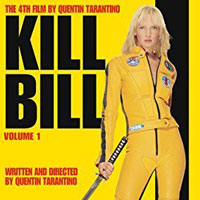
07. Kill Bill: Volume 1 (2003)
Watch the Trailer"Let's pretend we're little kids and we're making a Super 8 movie in our back yard, and you don't have all this shit. How would you achieve this effect? Ingenuity is important here!"
The fact that Uma Thurman helped Quentin Tarantino conceive the martial arts film Kill Bill during Pulp Fiction’s production becomes acutely obvious very quickly, as this film is undeniably The Uma Show. Her character, a nameless bride, wakes up to find her unborn baby is gone, and she seeks vengeance on the team of assassins she was once a part of. And you better believe she does just that, with so much bloody cartoon violence and such an immensely excessive death toll left in her footsteps, that there was no real need for any backstory here in the first place. Rather, this silly bit of cinema hyperspeeds along the surface, supported solely by flaunting fight scenes and sharp eye-candy, featuring characters void of any depth, who cling onto so many cultural nods that Quentin’s love for film is worn more proudly on his semen-encrusted director’s cap here, than probably anywhere else. However, any soul or intelligence deficiencies are expertly distracted by its overpowering entertainment value, swords swinging and guts spraying so abundantly that you can almost hear Tarantino laughing joyfully behind the camera, like the sick sadistic fuck we know he is. Granted, this film may only be half of the whole story, but once it reaches the credits, it doesn't feel like an incomplete piece of work whatsoever, and while it wasn’t every fan’s favourite cup of revenge, $180 million box office (his highest up to that point) doesn't lie really.
Recurring contributors: Zoë Bell; Michael Bowen; Laura Cayouette; Julie Dreyfus; Sid Haig; Samuel L. Jackson; Helen Kim; Jonathan Loughran; Michael Madsen; James Parks; Michael Parks; Stevo Polyi; Shana Stein; Bo Svenson; Uma Thurman; Venessia Valentino

06. Kill Bill: Volume 2 (2004)
Watch the Trailer"What if a kid goes to school after seeing Kill Bill and starts slicing up other kids? You know, I'll take that chance!"
The Bride may have continued on her sweet little vengeful mission here, but the two Kill Bill parts were almost incomparable. Gone was the gore and the rushed action of the original, now replaced by personal developments, lengthy dialogue, and a carefully relaxed pacing which lay down with a significantly decreased body count (92 less, to be exact). Such an encouragement of heart over heart attacks was not as immediately appealing as the previous slaughter commotion, and initial fans struggled to stomach the anticlimax, failing to appreciate how the additional substance justified the first part’s absurd assault, ultimately leaving the second volume as the far more important of the two. It gave the first bloody mess a purpose and a better context, which I guess is what happens when you split one film in half, but whatever, that doesn't matter. What does matter, however, is that many used the Kill Bill chapters as landmark examples of where Tarantino was supposedly spiralling, the public doubting whether he had any good films left in him whatsoever. Thankfully, hindsight has proved them all deadly wrong. Instead, time has passed and other great (great!) films were produced, and now we can all appreciate this affair as yet another fantastic and worthy Tarantino work, because he always had the talent to make any movie he wanted. He just wanted to make these movies.
Recurring contributors: Zoë Bell; Michael Bowen; Laura Cayouette; Julie Dreyfus; Sid Haig; Samuel L. Jackson; Helen Kim; Jonathan Loughran; Michael Madsen; James Parks; Michael Parks; Stevo Polyi; Shana Stein; Bo Svenson; Uma Thurman; Venessia Valentino

05. The Hateful Eight (2015)
Watch the Trailer“Twice per season, those shows [Bonanza, The Virginian and The High Chaparral] would have an episode where a bunch of outlaws would take the lead characters hostage [...] I don't like that storyline in a modern context, but I love it in a Western, where you would pass halfway through the show to find out if they were good or bad guys, and they all had a past that was revealed. I thought, 'What if I did a movie starring nothing but those characters? No heroes, no Michael Landons. Just a bunch of nefarious guys in a room, all telling backstories that may or may not be true. Trap those guys together in a room with a blizzard outside, give them guns, and see what happens.”
Of all the entries from the Tarantino cannon, The Hateful Eight had unquestionably the most turbulent history. Personally, I was somewhat disappointed that this mystery film was yet another Western, initially envisioned as a Django Unchained sequel, indicating that our special Quentin had found his passion and it didn’t coincide with mine. Even more damaging, was when the script leaked almost two years before the release date, enraging the man so passionately that he nearly shelved the whole idea—imagine! It’s a goddamn blessing, then, that neither of these concerns were warranted, as this movie turned out to be the man’s most thought out piece of work since Pulp Fiction, as well as furthering the impressive continuation of his second wind. Telling the backstories of various heinous characters who are trapped in a cabin due to a snowstorm, it reveals its intent at a heavy pacing by using all the signature Tarantino carnage and dialogue you demanded, really forcing the viewer into the claustrophobic room whilst achieving so much stress with so little accessories, communicating like a stage play over any usual film techniques. Which is to summarise, that there wasn’t all that much to work with here, and in that way, demonstrated that Tarantino was still challenging himself above challenging any of us, which is invaluable. And then... there’s Jennifer Jason Leigh. My God.
Recurring contributors: Zoë Bell; Bruce Dern; Walton Goggins; Dana Gourrier; Lee Horsley; Samuel L. Jackson; Keith Jefferson; Michael Madsen; Belinda Owino; James Parks; Tim Roth; Kurt Russell; Craig Stark

04. Django Unchained (2012)
Watch the Trailer"What happened during slavery times is a thousand times worse than [what] I show. So if I were to show it a thousand times worse, to me, that wouldn't be exploitative, that would just be how it is. If you can't take it, you can't take it.”
Surprisingly, for such a latter day film, none came with the same potent controversy as Django Unchained did. Telling the tale of a freed slave attempting to rescue his wife, this extravagant Spaghetti Western tackled the dark side of black history without giving a fuck in the way only Tarantino would dare. It was called an exploitative, politically incorrect, inaccurate and tasteless portrayal of slavery, crudely balancing the revolting shock of the era with a cheesy playfulness, without approaching the harsh topic with caution or to even turn around and apologise for what he has done. However, it was this lack of restraint that made Django Unchained potentially his most entertaining (and funniest!) flick, delivering on everything his past talents had promised (the cartoon violence, the chatty narrative, the rich development, etc) with the most immaculate of immaculate casting to back him up, as long as you ignore the director’s worst cameo yet. Take Jamie Foxx’s main character, for example, as the greatest hero in Quentin’s factory (in my opinion), whilst Leonardo DiCaprio gives a career defining performance, and round it off with Samuel L. Jackson's uniquely treacherous character, a risky individual for an actor who usually just plays himself. That said, none of these outstanding acts managed to out-stand Christoph Waltz, who stole the whole fucking film as his own, which I guess is just what he does. Sadly, these pretty faces may not have been enough to carry such a tiring length to the very end, and most agree that the picture did beg for a small edit, but as a whole, this ride was so fresh and wild that it was here and only here that Tarantino’s genius was solidified as something beyond any reasonable fluke. Because, by this point, he's made far too many treasures for his skills to be anything but God-given. Bang!
Recurring contributors: Michael Bacall; Zoë Bell; Michael Bowen; Laura Cayouette; Bruce Dern; Walton Goggins; Dana Gourrier; Lee Horsley; Samuel L. Jackson; Keith Jefferson; Belinda Owino; James Parks; Michael Parks; Craig Stark; David Steen; Shana Stein; Christoph Waltz

03. Inglourious Basterds (2009)
Watch the Trailer"I'm going to find a place that actually resembles, in one way or another, the Spanish locales they had in Spaghetti Westerns – a no man's land. With U.S. soldiers and French peasants and the French resistance and German occupation troops, it was kind of a no man's land. That will really be my Spaghetti Western but with World War II iconography. But the thing is, I won't be period specific about the movie. I'm not just gonna play a lot of Édith Piaf and Andrews Sisters. I can have rap, and I can do whatever I want. It's about filling in the viscera."
When it came to the intentionally misspelled Inglourious Basterds, even Tarantino knew he was onto a winner. The American-German war film (unlike any other war film) took it upon itself to rewrite the past however it saw fit, guaranteed to piss historians right off with its inaccurate tale of vengeful Jews and their violent plans against Nazi leaders—which was just the type of irresponsible idea that Quentin would be very precious about. So much so, that he spent over a decade writing it, a feat that alone verified his adoration for cinema, especially when ‘love of cinema’ was an essential part of the whole plot. And his dedication paid off, as this was the director’s undeniable comeback film, finally a real movie after such a strew of self indulgent wobbles, setting the stage for the greats that followed soon after (even if none of them were quite as good as this). It may have been a silly plot if you stepped back and thought about it, but he never gave you the chance to step back or think, rather cutting into your forehead with a devilishly devious story which did not rely on artiness or excessive violence to express itself, ultimately standing up there with the very best of his best, and a complete masterpiece in my respectful opinion. Hell, Christoph Waltz even won an Oscar for his part, because, goddamn, he made this film what it was, as much as this film made him who he is right now today.
Recurring contributors: Michael Bacall; Zoë Bell; Omar Doom; Julie Dreyfus; Samuel L. Jackson; Harvey Keitel; Tina Rodriguez; Eli Roth; Bo Svenson; Christoph Waltz

02. Reservoir Dogs (1992)
Watch the Trailer“Reservoir Dogs is a small film, and part of its charm was that it was a small film. I'd probably make it for $3 million now so I'd have more breathing room.“
I was far too young when I watched Reservoir Dogs for the first time. I can still remember it all too well: little Jared, witnessing the aftermath of a jewellery heist gone wrong, criminals speculating that they had a cop in their crew, stitching together the nonlinear plot with pop culture references and extravagant profanity, the story exclusively herded by the criminal’s individual personalities, entirely dependent on their natural dialogue and quick wit to make this show work, because there wasn’t enough money for anything else. And this fucked me up. The reason for my youthful troubles wasn't so much the grisly violence, as Dogs' bloodshed was quite tame in comparison to the exaggerated disturbances that came later in the man's career, but rather, it was the delivery and consequence of said violence that made everything all that more unnerving. So ruthless. So ugly. So sadistically sick that even horror film pioneer Wes Craven walked out of its initial screening due the savage nastiness, and that’s about as complimentary as you can get. Meanwhile, the rest of us called it a cult classic, the greatest independent film of all time, and even the greatest debut of all time, none of which I can disagree with. Fuck me if I can think of anything more worthy of those crowns, can you?
Recurring contributors: Steve Buscemi; Linda Kaye; Harvey Keitel; Michael Madsen; Stevo Polyi; Tim Roth; David Steen; Rich Turner

01. Pulp Fiction (1994)
Watch the Trailer"I got the idea of doing something that novelists get a chance to do but filmmakers don't: telling three separate stories, having characters float in and out with different weights depending on the story [... the idea] was basically to take like the oldest chestnuts that you've ever seen when it comes to crime stories—the oldest stories in the book.... You know, 'Vincent Vega and Marsellus Wallace's Wife'—the oldest story about ‘the guy's gotta go out with the big man's wife and don't touch her.’ You know, you've seen the story a zillion times [...] I'm using old forms of storytelling and then purposely having them run awry [...] Part of the trick is to take these movie characters, these genre characters and these genre situations and actually apply them to some of real life's rules and see how they unravel."
Ok, so here we go. With several disjointed violent crime tales interconnecting everything all out of order, Pulp Fiction is at least four films rather than one. It was reportedly 'too demented' for Columbia TriStar, and instead became the first fully-funded film Miramax ever put out. It demanded the attention and concentration of multiple viewings to fully appreciate the dark wit and sharp sleaziness of this director, one who had gained full confidence without losing his B-movie edge inside of an overindulgent-prostate, like pretty much everything else that came out of him afterwards. You can actually watch this movie as many times as you like, I’ve seen it a million times and want to watch it right now. Its pop culture references and countless homages were twisted so far from their original mothers that they became unrecognisable, whilst every (every!) scene from the film became easily parodied cinema classics themselves. It single-handedly revitalised Travolta’s career. It was the first 'indie' film to surpass $100 million. It was nominated for seven Oscars. It was an influential masterpiece, essentially a phenomenon, and the best film Tarantino ever made. One of the best films ever made? Perhaps the best film ever made.
Recurring contributors: Steve Buscemi; Samuel L. Jackson; Linda Kaye; Harvey Keitel; Tim Roth; Uma Thurman; Rich Turner; Venessia Valentino Follow @LegoTrip



